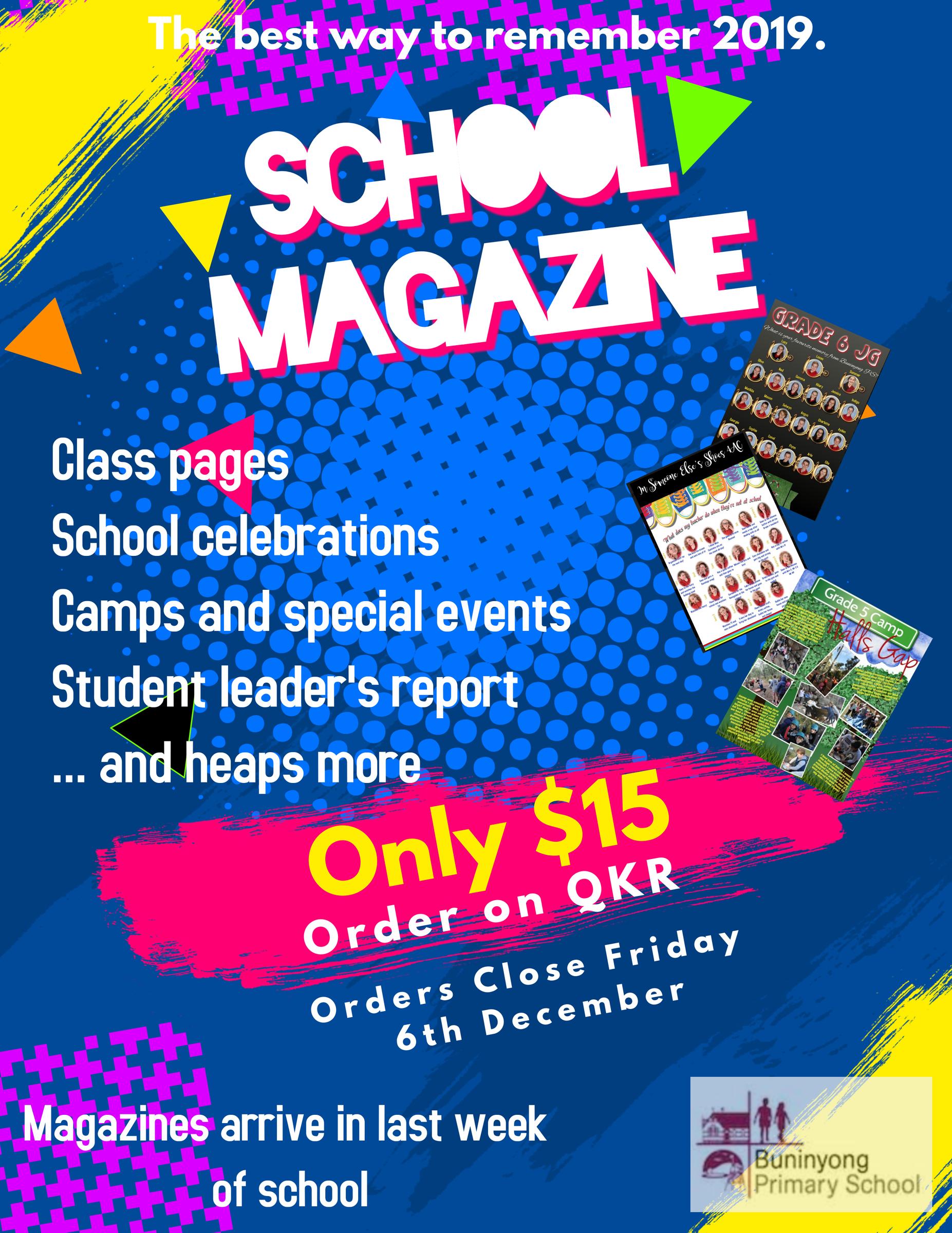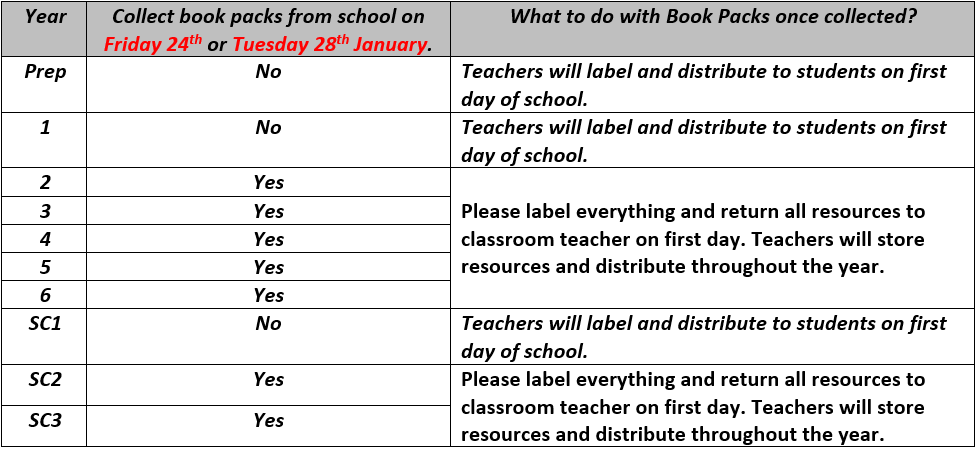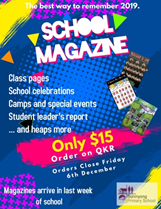Teaching & Learning

Book Packs 2020
Thanks to everyone who has been able to order their book packs through the school. It is an important part of starting the new learning year in an organised fashion. Developing routines and rituals will be a major focus for all teachers in the first few weeks of 2020 and this does heavily rely on all students having the correct materials available on day 1.
Please see the table below to help with organisation of Book Packs for the 2020 school year.
Please make payments prior to Thursday 30th January.
Should you require more information about payment or organisation of book packs, our office staff will be very happy to assist.
Parent Teacher Interviews
Thanks to everyone who attended our Parent Teacher Interviews over the past two week. They were very well attended with lots of great discussions regarding the learning journey our students have been on for the last 12 months. Just by turning up to be part of the discussion sends an important message to your child that learning matters, so thank you.
School Magazine
If you missed the cut off date for purchasing a school magazine don't despair, we have some extra copies available at the school office.
For those families who did purchase a copy or two, these will be sent home with students today.
Graduation and Final Assembly
This is a reminder that this year we will be streaming the Graduation Ceremony and last assembly live to school families with the link.
These live telecasts will be private and not available to all on the web. They will be only available to families of the school who have the link. This link becomes dead as soon as the telecast finishes.
These telecasts will not provide close up shots of students but will rather be long shots to give an indication of what is happening on stage.
Process
Graduation:
The day of the event we will send a link to Grade 6 families.
Use this link to log into the live telecast.
After watching simply click stop and browse away from the site.
End of Year Assembly:
The night before the assembly a Compass message will be sent to all families with a link.
Use this link to log into the live telecast.
After watching, simply click stop and browse away from the site.
Holiday Time Doesn’t Mean the Learning Stops
Source www.melbournechildpsychology
The holidays are a time for rest, relaxation, family time and celebrations.
But learning doesn’t have to stop when the school gates close…
You can help foster a love of learning in your children over the holidays.
And they won’t even know it!
Below are some great school holiday activities that get kids engaged, curious and excited about learning… which will help them to embrace their education once they’re back at school and understand the value of learning for the rest of their lives.
1. Go to museums.
It’s an obvious choice for good reason:
Kids love the interactive, tactile and three-dimensional experience of learning at museums.
‘Museums offer a dynamic opportunity to expose children to experiences and explore new things in a rich and educational environment,’ explains Sara Choi, Education Program Manager of a Children’s Museum.
‘Through interactive exhibits and hands-on play, children have the ability to take ownership of their own learning and develop and explore their own curiosities. This unique exposure provides the foundation for creativity, critical thinking, and connection to the world around them.’
A study from a few years ago also testified to the educational and personal benefits of visiting museums.
It found that kids who did:
- demonstrated stronger critical thinking skills,
- displayed higher levels of social tolerance,
- exhibited greater historical empathy, and;
- developed a taste for art museums and cultural institutions.
And there’s opportunities for engagement and learning for children of all ages.
Younger children can benefit from focused exhibitions that encourage experiential play and problem solving.
And older kids and teenagers can learn about art, history, culture, the environment, science and more outside of the school environment, and without the pressures of assessments.
This different experience of learning can foster more active engagement with topics and ideas that will then transfer into their curriculum at school…
And active engagement is a crucial element of successful learning.
Take your kids to museums and galleries of all types, and encourage questions and discussions that will ignite their curiosity.
It not only provides the perfect opportunity for family bondings, it can also help to boost creativity, develop problem solving skills, support active inquisition and a love of learning.
2. Take them to the supermarket.
You read right!
A study into childhood learning — aptly named The Supermarket Study’ — involved placing signs with questions on items around the supermarket.
Questions like ‘where does milk come from?’ and ‘what else comes from a cow?’ were designed to encourage dialogue and evoke curiosity and inquisition from the children.
The results saw a one-third increase in conversations between parents and children — a pivotal form of informal education.
And while the study was conducted with children under 8, the inherent principles can be used with kids (and even adults!) of all ages.
The idea is to create opportunities for learning outside of the school setting and in the real world.
Think about how many interesting and potentially unanswered questions we can ask about the world on a daily basis:
What kind of trees line your street, how your groceries get from where they’re grown to in your kitchen, or how the technology in your home was developed…
There’s myriad of opportunities for learning all around you.
By encouraging your kids to question the how and why of these mundane things, you’re fostering a love of learning and a thirst for knowledge.
Yes, you read right again!
The holidays can often be a constant battle of finding new and interesting things to keep kids entertained.
But there’s a lot to be said for leaving them to their own devices and letting them just be.
‘Children need time to themselves – to switch off from the bombardment of the outside world, to daydream, pursue their own thoughts and occupations and discover personal interests and gifts’, explains Teresa Belton.
Children of the digital age are used to having constant entertainment and instant gratification.
So removing these distractions allows some much-needed time for quiet reflection, a wandering mind and developing creative strategies to keep them entertained.
The best type of boredom can be found in the great outdoors, where they can investigate the natural environment.
It also encouraged imaginative play, which helps kids to express their creativity.
Encourage your older kids and teenagers to go for walks, sit in the park, and experience the world through their own eyes — even for a few minutes a day — instead of through their phone screen.
4. Make reading part of the routine.
Regular routines go out the window when school stops…
But you can still keep a sense of routine and important daily rituals, all through the holidays.
Reading is one of the best forms of learning for all kids (and that includes reading to them):
Younger kids develop language skills, improve literacy and put their imagination to good use…
While for older kids, fiction books can further support their writing skills, and through non-fiction they can learn about topics that interest them that they may or may not study in the school environment.
Reading can also aid relaxation and reduce stress and anxiety, increase empathy, and promote good sleeping habits.
Jamf is coming to Buninyong PS.
In term 3 this year, we surveyed parents, staff and students on ICT usage at our school. We received some really helpful feedback across the different groups. One of the general messages that parents gave us was the desire to be supported in managing iPad usage at home. With this in mind, we have worked with the department to explore different ways of managing iPads to minimise distractions at school and at home. After a lot of investigating we have decided to move to using Jamf as our Mobile Device Management (MDM) software. Jamf will bring a range of benefits to our BYOD program as well as helping us manage the classroom iPads and providing support for parents to also manage usage at home. For families involved with the BYOD program next year, a letter will be sent home this week with further details on Jamf and how it will affect the setup of devices in 2020.
Regards
Aaron Coulter
Learning Specialist - Stem



